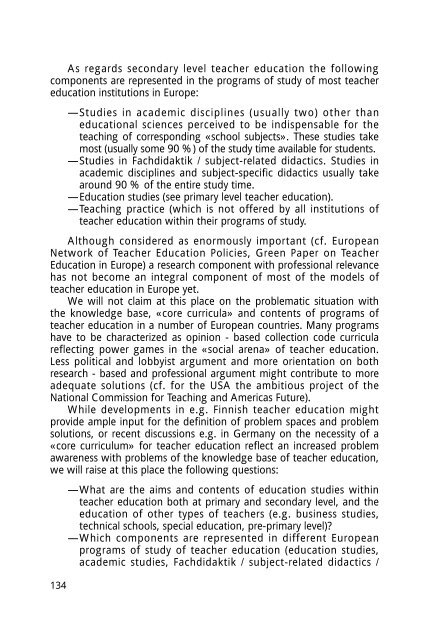Final Report Pilot Project - Relaciones Internacionales de la ...
Final Report Pilot Project - Relaciones Internacionales de la ...
Final Report Pilot Project - Relaciones Internacionales de la ...
Create successful ePaper yourself
Turn your PDF publications into a flip-book with our unique Google optimized e-Paper software.
As regards secondary level teacher education the following<br />
components are represented in the programs of study of most teacher<br />
education institutions in Europe:<br />
—Studies in aca<strong>de</strong>mic disciplines (usually two) other than<br />
educational sciences perceived to be indispensable for the<br />
teaching of corresponding «school subjects». These studies take<br />
most (usually some 90 %) of the study time avai<strong>la</strong>ble for stu<strong>de</strong>nts.<br />
—Studies in Fachdidaktik / subject-re<strong>la</strong>ted didactics. Studies in<br />
aca<strong>de</strong>mic disciplines and subject-specific didactics usually take<br />
around 90 % of the entire study time.<br />
—Education studies (see primary level teacher education).<br />
—Teaching practice (which is not offered by all institutions of<br />
teacher education within their programs of study.<br />
Although consi<strong>de</strong>red as enormously important (cf. European<br />
Network of Teacher Education Policies, Green Paper on Teacher<br />
Education in Europe) a research component with professional relevance<br />
has not become an integral component of most of the mo<strong>de</strong>ls of<br />
teacher education in Europe yet.<br />
We will not c<strong>la</strong>im at this p<strong>la</strong>ce on the problematic situation with<br />
the knowledge base, «core curricu<strong>la</strong>» and contents of programs of<br />
teacher education in a number of European countries. Many programs<br />
have to be characterized as opinion - based collection co<strong>de</strong> curricu<strong>la</strong><br />
reflecting power games in the «social arena» of teacher education.<br />
Less political and lobbyist argument and more orientation on both<br />
research - based and professional argument might contribute to more<br />
a<strong>de</strong>quate solutions (cf. for the USA the ambitious project of the<br />
National Commission for Teaching and Americas Future).<br />
While <strong>de</strong>velopments in e.g. Finnish teacher education might<br />
provi<strong>de</strong> ample input for the <strong>de</strong>finition of problem spaces and problem<br />
solutions, or recent discussions e.g. in Germany on the necessity of a<br />
«core curriculum» for teacher education reflect an increased problem<br />
awareness with problems of the knowledge base of teacher education,<br />
we will raise at this p<strong>la</strong>ce the following questions:<br />
134<br />
—What are the aims and contents of education studies within<br />
teacher education both at primary and secondary level, and the<br />
education of other types of teachers (e.g. business studies,<br />
technical schools, special education, pre-primary level)?<br />
—Which components are represented in different European<br />
programs of study of teacher education (education studies,<br />
aca<strong>de</strong>mic studies, Fachdidaktik / subject-re<strong>la</strong>ted didactics /


